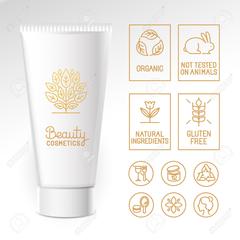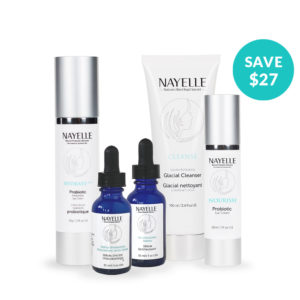The Importance of Reading Cosmetic Labels

The beauty industry has an ugly secret.
Your makeup, face cream, skin moisturizer, or cleanser may deliver short term smoothness and brightness, but it may disrupt your hormones and fertility, expose you to known cancer-causing pesticides, and deliver dangerous toxins that penetrate and age your skin.
That’s right. The cosmetics you use may actually speed the formation of wrinkles, age spots, and worse.
In the US, researchers have found 1 of every 8 ingredients used in cosmetics is an industrial chemical. Many of these were originally created to keep concrete soft, remove grease from auto parts, and as surfactants paints and inks.
 Having a sensitive skin type can mean different things to different people. It can be caused by skin conditions such as rosacea, eczema or allergies. Sensitive skin can become inflamed and irritated easily. It is important to choose the right skin care for sensitive skin because many cleansers and moisturizers contain ingredients that can cause an adverse reaction.
Having a sensitive skin type can mean different things to different people. It can be caused by skin conditions such as rosacea, eczema or allergies. Sensitive skin can become inflamed and irritated easily. It is important to choose the right skin care for sensitive skin because many cleansers and moisturizers contain ingredients that can cause an adverse reaction.
Many people say they have sensitive skin because skin care products, or household products that contact their skin, cause stinging, burning, redness, or tightness. Or they say they have it because even though they have no visible effects after contact with a product, it always makes their skin feel uncomfortable.
That’s why whether you have sensitive skin or not, it is very important to read the label. Here are some factors that everyone should be aware of:
- Look out for parentheses
Ingredient names can be pretty long and often go by a common name for easy reference. Common names of ingredients are listed in parenthesis next to its formal chemical name. You can also tell which ingredients have higher concentrations because ingredients are listed in order from greatest to least amount.
- Hypoallergenic
A product that is “hypoallergenic” is supposed to produce fewer allergic reactions than other products. The term hypoallergenic is very popular with cosmetics, especially when marketing products to sensitive skin consumers. Before you buy into the hype, you should know that there are currently no federal standards or definitions that regulate the use of the term or ensure that products labeled as hypoallergenic are less irritating.
- What’s the shelf life of the product?
Look for an open container symbol or expiration date which can tell you how long a product is considered good to use under normal conditions of storage and use. Storing cosmetics in warm humid environment can lead to earlier expiration.
- Will it clog my pores?
If a cosmetic is labeled “noncomedogenic,” it means that the cosmetic product is not supposed to clog skin pores. Skin that can’t breathe under makeup can cause and irritate blemishes.
- Who makes this product?
“Manufactured” and “distributed” might seem like the same thing, but they’re not. Distributors of cosmetic products are not liable for product claims the cosmetics manufacturer is the one responsible for accurate labeling and whether the product lives up to its claims.

- Be wary that some ingredients can be disguised as others.
There are some newer preservatives that also act as a masking agent. That means brands can list the preservative as a ‘fragrance’ in the ingredient listing, and make it look like the product is preservative free.
- Alcohol-free
When a personal care product has “alcohol-free” listed on its label, it might only be telling part of the truth. There are many different types of alcohol and when a cosmetics label says “alcohol-free” it most often refers to being ethyl alcohol free. Your product still may contain other types of alcohol, such as cetyl, stearyl, cetearyl or lanolin alcohol.
- Too many ingredients can be bad
Cosmetics and personal care products with a long list of ingredients is something you should take note of because the more ingredients it has, the more likely it is that the product or its ingredients have been tested on animals. Organic cosmetics companies usually have a short ingredients list because their products are less processed and more holistic based.
- How the product is tested
If a cosmetics label says its “cruelty-free” or “not tested on animals,” it means that the product, and not necessarily its ingredients, hasn’t been tested on animals. That’s where the difference lies because you might be buying a product that you think is cruelty-free yet the ingredients are animal tested.
Of course the safest course of action is to seek out natural and organic products but even here you have to beware. Some unscrupulous manufacturers mislead their customers with false labels. The industry’s definitions (whilst legal) are not the same as those in the dictionary and which the majority of consumers would expect.
Organic products tend to be very hypoallergenic. It is recommended to people with sensitive skin or prone to allergic reactions. But because they don’t have the usual chemical preservatives, they have a shorter shelf life than most. It’s a small price to pay, however, not to have allergic reactions with bath and body products we use, especially if they come with an exorbitant price tag.
Organic cosmetics are created from ingredients which have been certified organic by one of the numerous certifying institutions that operate worldwide. An organic ingredient is formally an ingredient which has been harvested without the use of synthetic chemical compounds. Organic cosmetics are produced from the best natural component of plants and flowers that do not result in skin irritation at all as compared to the chemical based cosmetics. Since organic cosmetics do not use synthetic chemicals on it, you can be sure that your skin is getting the best care there is. Once a rarity, have become popular fare, with all kinds of makeup and skin care products available for the taking. Moreover, organic cosmetics tend to offer the added benefits of using complementary natural products that tend to decrease the risk of harsh skin irritations and allergies. When you apply organic cosmetics, you’re using materials that a lot better than harmful chemicals. Also, their properties to moisturize, smooth and care about your skin gently are among the most important advantages of organic cosmetics.
NAYELLE skincare products offer holistic results but also you will be worry free with its wide selection of cosmetics and skin care products, from masks to moisturizers. Keep your skin looking healthy and beautiful inside and out. There is no other beauty than natural beauty.

